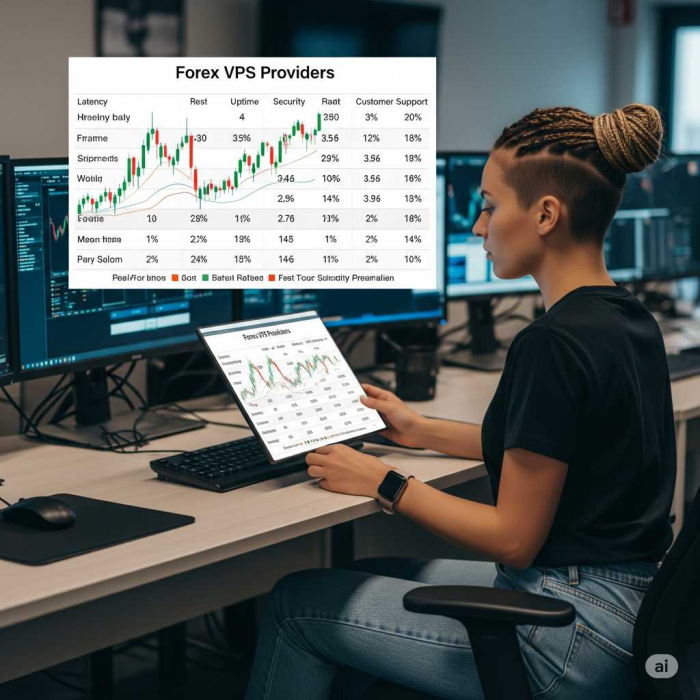Choosing Your Trading Edge| A Guide to Selecting a Reliable Forex VPS Provider
In the fast-paced world of forex trading, every millisecond counts. For serious traders, especially those relying on Expert Advisors (EAs) and automated strategies, a reliable Forex Virtual Private Server (VPS) isn't a luxury – it's a necessity. A dedicated VPS provides a stable, low-latency environment that ensures your trading platforms run 24/7, impervious to power outages, internet disruptions, or personal computer glitches.
But with a multitude of VPS providers vying for your attention, how do you choose the one that truly offers a trading edge? This blog post will walk you through the critical factors to consider when selecting a reliable Forex VPS provider.

Why a Forex VPS is Non-Negotiable for Serious Traders
Before diving into selection criteria, let's quickly recap the paramount benefits of using a Forex VPS:
- Ultra-Low Latency: Proximity to your broker's servers means faster order execution and reduced slippage, crucial for capitalizing on fleeting market opportunities.
- 24/7 Uptime: Your trading platform and EAs run continuously, even when your local computer is off or disconnected, ensuring you never miss a trade.
- Enhanced Security: Dedicated resources and robust security measures (firewalls, DDoS protection, encryption) safeguard your sensitive trading data.
- Reliability & Stability: Enterprise-grade hardware and redundant systems minimize downtime, offering a consistent trading environment.
- Remote Accessibility: Access your trading platform from anywhere in the world with an internet connection.
- Compatibility: Most Forex VPS providers support popular trading platforms like MetaTrader 4 (MT4) and MetaTrader 5 (MT5), along with various EAs and custom indicators.
Key Factors to Consider When Choosing a Forex VPS Provider
Now, let's break down the essential elements to evaluate:
1. Server Location and Latency
This is arguably the most crucial factor. The closer your VPS server is to your forex broker's data center, the lower your latency will be. Lower latency translates directly to faster trade execution and reduced slippage. Look for providers with data centers in major financial hubs like New York (NY4), London (LD4), Tokyo, or Amsterdam, especially if your broker has servers in those locations. Many providers will highlight their latency to key broker data centers.
2. Performance Specifications (CPU, RAM, SSD)
Your trading platform, especially with multiple charts, indicators, or EAs, requires sufficient computing power.
- CPU: Look for adequate processor cores to handle your trading applications smoothly.
- RAM: Ensure enough RAM is allocated to prevent lag and ensure seamless operation, especially if you run multiple trading terminals or resource-intensive EAs.
- Storage (SSD/NVMe SSD): Opt for SSD (Solid State Drive) or, even better, NVMe SSD storage. These are significantly faster than traditional HDDs, leading to quicker data retrieval and overall better software performance.
3. Uptime Guarantee
A reliable Forex VPS provider should offer a high uptime guarantee, typically 99.9% or higher. This signifies their commitment to keeping your server online and your trading uninterrupted. Downtime can lead to missed opportunities and potential losses, so this is a non-negotiable.
4. Security Measures
Your trading data is sensitive. Ensure the VPS provider offers robust security features:
- DDoS Protection: Protects your server from distributed denial-of-service attacks.
- Firewalls: Filters network traffic to prevent unauthorized access.
- Regular Backups: Ensures your trading data and configurations are backed up in case of any issues.
- Data Isolation: Your VPS should be isolated from other users to minimize shared environment risks.
- Optional Features: Consider providers offering two-factor authentication (2FA) for added security.
5. Operating System Compatibility
Most forex trading platforms (like MT4/MT5) run on Windows. Ensure the VPS provider offers Windows Server versions that are compatible with your trading software. Some providers might also offer Linux options, but Windows is generally preferred for ease of use with trading terminals.
6. Scalability Options
Your trading needs might evolve. Choose a provider that allows you to easily upgrade or downgrade your VPS plan (CPU, RAM, storage) as your requirements change, without significant downtime.
7. Customer Support
Even the most robust systems can encounter issues. Responsive and knowledgeable customer support is vital. Look for:
- 24/7 Availability: Trading happens around the clock, so support should be too.
- Multiple Contact Channels: Live chat, phone, and email support are ideal.
- Forex-Specific Knowledge: Support staff who understand trading platforms and EAs can troubleshoot issues more effectively.
8. Pricing and Value for Money
While cost is a factor, it shouldn't be the sole determinant. Compare pricing plans across providers, but always weigh the cost against the features, performance, and reliability offered. Be wary of excessively cheap options, as they might compromise on crucial aspects. Some brokers also offer free VPS services based on certain trading volume or account balance requirements.
9. Reviews and Reputation
Do your due diligence. Read reviews from other forex traders on independent forums and review sites. Look for consistent positive feedback regarding uptime, performance, customer service, and overall reliability.
The Bottom Line
Choosing a reliable Forex VPS provider is an investment in your trading success. By carefully evaluating these factors, you can select a partner that provides the stable, low-latency, and secure environment necessary to execute your trading strategies with confidence and efficiency. Remember, in the world of forex, your infrastructure can be just as important as your strategy.
Popular Tags